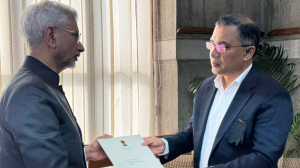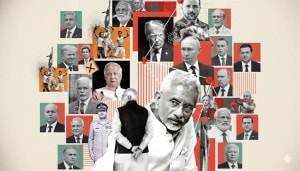Parenting on the move
Those were the days we were young and the world was young. I remember wearing pigtails, crisply-laundered uniforms, chatting away with fr...

Those were the days we were young and the world was young. I remember wearing pigtails, crisply-laundered uniforms, chatting away with friends and waiting for the school bus to arrive. Evenings were meant for the park 8211; where we played to our hearts8217; content. The park, with its swings and ample space to run around, was a veritable pleasure land! As I grew up, other activities took up the time that I had earlier spent at the park. Now, it was on to swimming, tennis and horse-riding. But even then, my friends and I loved taking long, leisurely walks around the park.
Growing up also meant parting with friends and acquaintances and making new ones. Leaving old schools to join new ones. Shifting out of homes into new houses. Moving away from familiar places and faces to different ones. Growing up meant constantly being able to adjust to new environs, customs, food habits. It meant moving from one cantonment to the other. You see, I am an army officer8217;s daughter.
Today, I am not just a parent of a four-year-old, but an army officer8217;s wife as well. Speaking for myself, I feel I have definitely gained a lot by my upbringing. I have learnt more than what any history or geography text book could have ever taught me. I have learnt and retained more about our vast country, its enduring customs and diverse ways of life. I have learnt this through the only way Mother Nature meant it to be 8211; by actually living in most of the places. Socially, it has made me more tolerant and amiable, as constantly having to live away from your home town helps one appreciate the fact that we are all different and yet the same 8211; Indians.
But is this all purely on account of differing environments in different places? Or is it the unique way of life in cantonments with their numerous social and leisure-time facilities? Don8217;t parents also have something to do with it.
8220;Children, they say, represent a quarter of the world8217;s population. I have seen children in all kinds of places 8211; villages, small towns, big cities. But everywhere I went, I was amazed to see children whose fathers were in the armed forces adapting to new surroundings with an ease that is remarkable,8221; opines Sandeep Chauhan, an entrepreneur whose father is a retired naval officer.
Says an eminent psychologist, 8220;A child8217;s personality is not basically equipped to accept such changes easily. They must, therefore, depend on their immediate family to help them adjust.8221; In the case of children with fathers in the armed forces, it is the mother the child mostly depends on.
Being separated from her husband often, an army officer8217;s wife has to cope with being both father and mother to her children. Seeing to her children8217;s education and their welfare, at times even managing a job and her numerous welfare activities, makes her schedule a very busy one. How does she manage it all? I decided to ignore the assumption that an army officer8217;s wife8217;s life is merely a series of chiffons and pearls. Instead, I decided to take a closer look at the mother8217; in her. Bringing up a child, and being almost solely responsible for his/her welfare, can be quite nerve-racking.
Take the aspect of education first. 8220;Speaking for myself, I remember my first day in various schools. There was that anxiety, coupled with excitement, at the prospect of being in a new school with a new teacher and friends. Of course, there are times when this constant change of schools could put the child under a lot of stress 8211; especially when the switch-over is from an English medium to a Hindi medium school or vice-versa. Here, the mother8217;s support and understanding could mean a lot to the child. She can encourage her child and make him/her fluent in both the languages,8221; reflects Sunil Kaushik, a serving naval officer whose father was also an officer in the Indian Navy.
An experienced teacher says of children who come on transfers. 8220;The older children take some more time to adjust. The main hitch is the change in levels and contents of the curricula. But handled correctly, with the right amount of patience and understanding, they cover up lost ground pretty soon. In fact, I8217;d go so far as to say that in the long run, above average children benefit from transfers, and are usually right up there with the toppers, be it in academics, sports or extracurricular activities.8221;
For most children whose fathers hold non-transferable jobs, the social environment is the same throughout their growing years. Not so in the case of the child whose father is in the armed forces. To this child, being constantly exposed to new environments, on an average of every two years, the parents8217; help and support are essential. Psychologists opine that in their case, the mother has to strive especially hard to build strong egos and indomitable spirits in her children, despite the constantly changing social environments.
Growing up in cantonments, fortunately, has its own advantages. Most of the time, the child is exposed to people whose mother tongues are different and yet live together in perfect harmony.
As a parent, I am obligated towards helping my child compete as best as she can in her world. If her teeth are crooked, I will see that they are straightened. If she flounders academically, I will arrange tutorial assistance. If doubts confronts her, I will help clear them. If she has questions, I will help her seek answers. We are allies, living and growing together, all the while striving to instill in her the values of life, of love for fellow-beings and truthfulness, of caring and sharing, and, above all, of zest for life.
- 01
- 02
- 03
- 04
- 05































